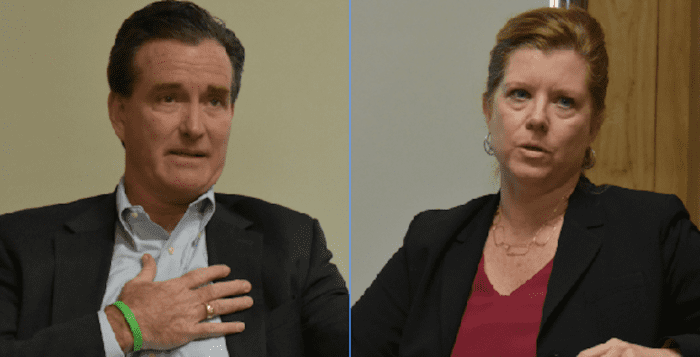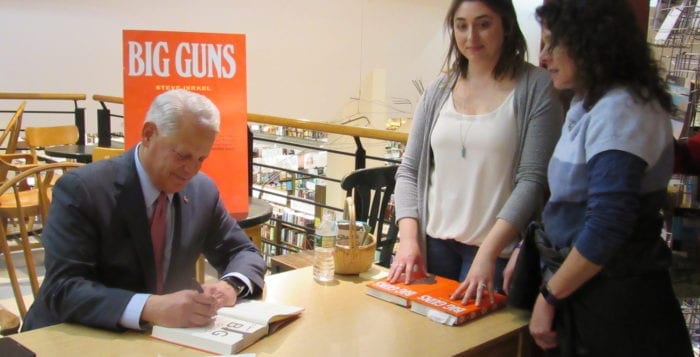State Sen. and Majority Leader John Flanagan (R-East Northport) believes his length of tenure is an asset to New York State’s 2nd Senate District, while Democrat Kathleen Cleary hopes to bring new ideas to the floor.
“I believe my opponent with the utmost sincerity takes it seriously. We just come at it from a different angle.”
— John Flanagan
Cleary, a 20-year resident also of East Northport, is a former contract manager for companies such as Citigroup and Merrill Lynch. While she thinks Flanagan has done a good job in his 32 years in office, she said she believes he has also held up key legislation including the Child Victims Act and Reproductive Health Act.
“We need to have new voices up there and to be able to be a little more diverse in backgrounds of people who are working there to be more reflective of the people in the district and not to have career politicians in the position for many years,” she said.
Cleary would like to see the Child Victims Act passed in the state Senate, which would extend the statute of limitations involving child sex abuse survivors in both criminal and civil cases and provide a one-year look-back window for victims to bring civil claims in cases where the statute of limitations has expired. She said most children don’t report a sexual crime because they are afraid the abuser will hurt them, or they weren’t aware what was done to them was wrong.
Flanagan said while the Senate has not passed the bill introduced by the state Assembly, senators have been working on pieces of legislation directed toward extending the time period to report from 23 to 28 years old or even 33 years in some cases.
“Everybody takes this issue seriously,” he said. “I believe my opponent with the utmost sincerity takes it seriously. We just come at it from a different angle.”
The two also disagreed on the best practice when it comes to gun legislation.
“We’re going to be penalized by the way our state funds our schools and that is something that we don’t want — to be cutting our budgets and taking money away from our children.”
— Kathleen Cleary
Cleary would like to see the Red Flag Gun Protection Bill pass. It would prevent those determined by a court to have the potential to cause serious harm to themselves or others from purchasing or possessing any type of firearm. The bill hasn’t made it to the Senate floor.
Flanagan said the Red Flag bill sounds great in theory, but is too broad to a point where it’s possible for a police officer’s firearm to be taken away. He believes it needs more work before it is passed.
He said part of the recent budget included new measures involving domestic violence and the ability for the abuser to have or not have a firearm. He believes in gun control and supported the New York Secure Ammunition and Firearms Enforcement Act of 2013.
“I took a lot of grief, which is fine,” the senator said. “I believe I made the right vote.”
As for money matters, both candidates looked toward schools as a way to save money for taxpayers.
Cleary said with the loss of the SALT deduction on federal taxes the state needs to rethink how it funds schools through property taxes.
“We’re going to be penalized by the way our state funds our schools and that is something that we don’t want — to be cutting our budgets and taking money away from our children,” she said.
Cleary talked about shared services for school districts, for example transportation, even though she believes districts should continue to have local control.
Flanagan said BOCES is an example of sharing services, and he believes keeping the 2 percent property tax cap is important for school districts as well as libraries, sewer districts and similar entities to control spending.
When it comes to the economy, Cleary and Flanagan agreed that the state needs to make it easier for entrepreneurs to start a business to help the local economy and conduct cost-benefit analysis on every regulation.
Flanagan said Gov. Andrew Cuomo (D) needs to stop blaming the federal government and president.
“[The governor] should be looking at his own house,” Flanagan said. “What is our tax policy here in New York? What are we doing for the middle class? What are we doing to make sure those high-income people stay in New York?”











